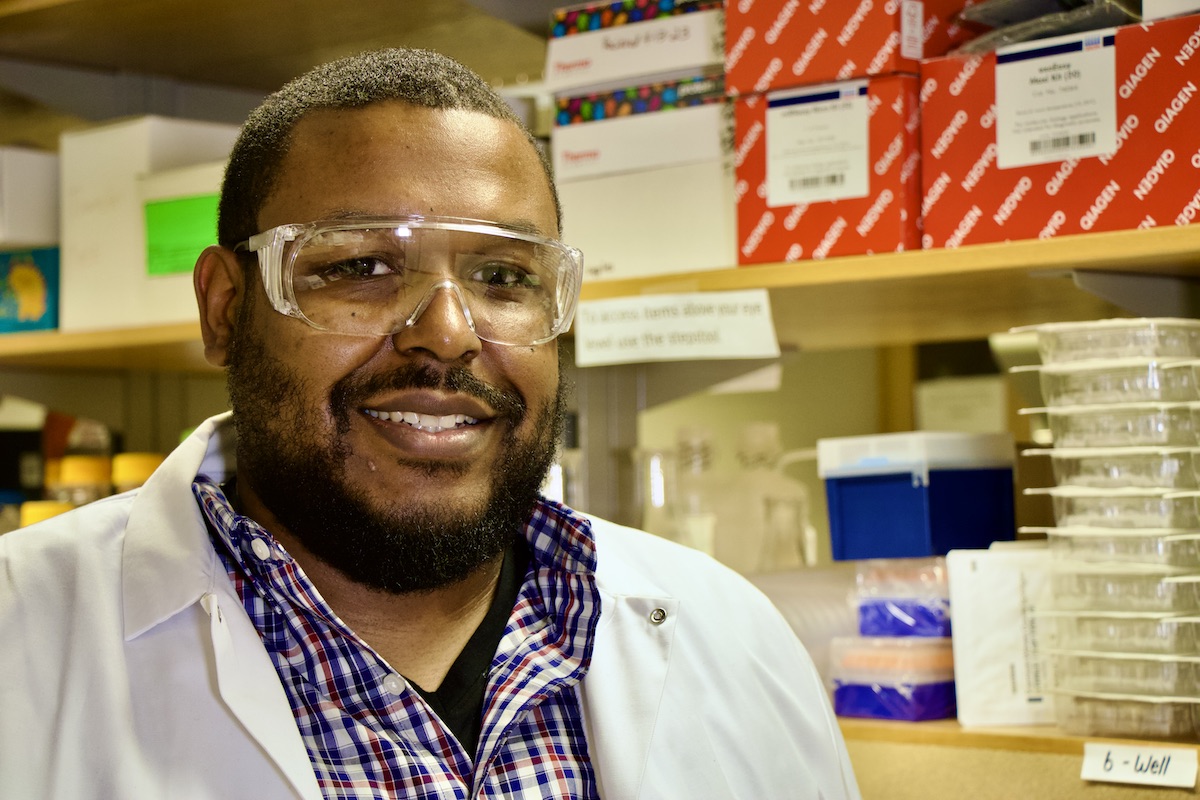Lundon’s calling: Purdue Health and Kinesiology PhD candidate strives for better understanding of cardiometabolic diseases

Lundon Burton
Written by: Tim Brouk, tbrouk@purdue.edu
Lundon Burton lives with what he researches.
The PhD candidate for the Purdue University Department of Health and Kinesiology was only a teenager when he first suffered the effects of atrial fibrillation (AFib), a type of arrhythmia characterized by fast and irregular heartbeats located in the upper chambers of the heart. The condition came to a peak as a redshirt freshman playing football as right tackle for Illinois State University, a then-highly ranked NCAA Division I-AA squad.
The rigorous practices wore on young Burton, a first-generation college student. He lost sleep. His energy levels were down, and he could feel his rapid heartbeats all the way into his neck. His mental health was suffering too. Burton stepped away from football and focused on learning about his condition, eventually conducting research on the human cardiovascular system. After changing his diet, exercise, and leaning into relaxation techniques, such as meditation and mindfulness, Burton can now play basketball, and he has plenty of energy to keep up with his 5-year-old daughter, Jessica. He is also energized by his latest research within the lab of Tim Gavin, Health and Kinesiology professor and department head.
“(AFib) was not something at the time that was typically talked about, certainly not with someone so young,” Burton said. “People often ask me, ‘What made you want to transition from athlete to academic?’ Well, here’s my story … .”
Burton’s most recent projects have focused on the interaction of cardiovascular endothelial cells, which line blood vessels, with skeletal muscle. The work speaks on the health impacts AFib had on his late teens and early 20s. This only strengthens his passion for physiological and cardiovascular research.
Burton also teaches HK 42100 (Health Screening and Fitness Evaluation and Design). The class usually only has about a dozen students, so he fields a lot of questions about his personal links to his research. He shares stories of his football days and how he successfully blocked AFib from his life after health professionals hooked him to an electrocardiogram, or EKG.
“I went years trying to figure out what was going on. I went to doctors’ appointments, and it wasn’t getting caught,” Burton remembered. “Is this going to be a lifelong thing I’d have to deal with? It took until I was about 25 years old for me to get with an electrophysiologist and a team of physicians to help me understand what was going on.
“Things really turned around for me just being able to know how to alter my lifestyle, to have a better quality of life.”
In the lab
One of Burton’s recent studies examined microvascular dysfunction of skeletal muscle within obese people.
“We study how communication from one tissue type can influence the health of another tissue type,” Burton explained. “We want to promote angiogenesis, which is part of healthy vascular function. It’s the growth of new blood vessels which increases capillary-to-muscle fiber ratio so we can better take in oxygen and remove waste. It can help lower blood pressure and improve other functions.”
Burton used near-infrared spectroscopy to observe oxygen tissue saturation within skeletal muscle from obese individuals. The muscle cells were then put through a series of processes and experimental tests to see how angiogenesis was impacted.
“We’re looking at how the lean, healthy group compares to our obese group in terms of their vascular responsiveness, how well the blood vessels respond, how well they can dilate and how well that muscle can be saturated with oxygen,” Burton said.
Another project looked at insulin resistance in obese individuals. Insulin resistance occurs in a window of time just before Type 2 diabetes presents itself.
“It doesn’t happen all the time (insulin resistance progressing to Type 2 diabetes), but it’s been happening at increasing rates as people have become more sedentary,” he continued. “I am looking to intervene and understand the cellular communication that’s going on at that point.
“The goal is to understand the mechanism that’s at play, and hopefully we can intervene and see how much the cellular communication piece itself is contributing to these deficiencies,” Burton said.
Purdue recruit
Burton was recruited by Gavin through the American College of Sports Medicine’s Leadership and Diversity Training Program. Burton had talked to Gavin about his educational background and his desire for research.
“I believe the research we do at the intersection of health and cardiovascular function is what drew Lundon to pursue his PhD with us at Purdue, as it combined his passion for understanding the detrimental causes of cardiovascular dysfunction with the beneficial effects of exercise on the cardiovascular system,” Gavin said.
Like an NCAA football coach landing a five-star recruit, Gavin was thrilled to bring Burton to Purdue Health and Kinesiology.
“I am very excited to work with Lundon. He continues to help advance the science in our lab,” Gavin said. “He has developed good leadership skills to go along with his strong team-player attitude. He has a bright future.”
Once sidelined by a heart condition, Burton is on his way to an all-pro, all-American research career.
“This is what I want to do: I want to help people who are in this position,” he said. “Research, teaching, awareness, and just empowering people to make alterations in their lifestyle, be it a diet plan, an exercise plan, sleep quality — these are all things that lead to a healthy lifestyle.
“It’s been a journey. It’s definitely been a journey.”
Discover more from News | College of Health and Human Sciences
Subscribe to get the latest posts sent to your email.